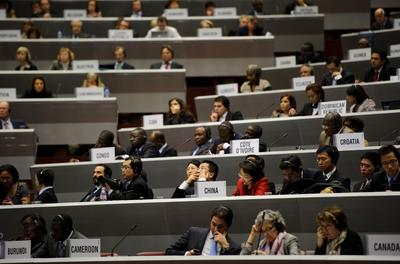The WTO Ministerial Conference is expected to confirm Russia’s accession to the organisation before the year’s end. By securing WTO membership just prior to hosting APEC, Russia appears to be taking a big step toward fully fledged integration into the global economy. With strong support from the US and the European Union, accession to the WTO will finally enable Russia to speak the common language of trade liberalisation with its Asia Pacific partners. Yet there is evidence to suggest that Russia may be unlikely — or unable — to fully capitalise upon the benefits that chairing APEC provides the host economy, partly as a result of Russia’s weak economic engagement with the Asia Pacific region.
First, Russia is not an intrinsic part of the region’s complex production networks, also known as supply chains. Unlike many other APEC economies, Russia does not add value to the variety of manufactured goods circulating throughout the region. Accordingly, its trade agenda is limited to boosting exports of raw materials and energy products directly to consumer countries, primarily China, the US, Japan and South Korea. Russia’s role in supporting sophisticated supply chains throughout the Asia Pacific in the form of services trade or investment is also negligible. In other words, Russia is not really a part of the de facto economic integration in the region.
Second, Russia is excluded from de jure economic integration in the form of trade agreements in the Asia Pacific. Although Russia has never explicitly articulated its trade policy, a set of old-generation FTAs exists with all Commonwealth of Independent States (CIS) members. Outside of the CIS, FTAs are largely ignored as a trade policy tool. Only recently in 2010 did Russia begin to show interest in FTA negotiations with the European Free Trade Area, made up of Iceland, Liechtenstein, Norway and Switzerland; and in early 2011, Russia started FTA negotiations with New Zealand. The Russian government perceives both of these endeavours as ‘pilot negotiating projects’. A feasibility study of an FTA with Vietnam is also in progress but the expected outcome is unclear. APEC economies may expect announcements of Russia’s intention to negotiate more agreements in 2012, but further opening up of the Russian market to the industrialised economies of the Asia Pacific may prove difficult.
Finally, throughout its 13 years of APEC membership, Russia has failed to clearly outline the economic interests it wishes to pursue with its regional APEC partners. Nor has it utilised numerous APEC opportunities to articulate its strategic trade vision. This is well indicated by its limited participation, and lack of submissions, to APEC committees and groups, including an indifference toward the agendas of important APEC fora such as the Economic Committee and the Committee on Trade and Investment. The only APEC forum with which Russia has recorded engagement is the Counter-Terrorism Task Force, further indicating that Russia’s participation seems not to be driven by economic considerations.
Consequently, Russia will likely focus on a number of more narrowly defined initiatives in drafting the 2012 APEC agenda. Russian President Dmitry Medvedev’s remarks in Honolulu and a recent APEC meeting in St.Petersburg suggest the topics of interest will be energy, transport and food security. Russia apparently sees APEC as an opportunity to assert its role as a premier energy supplier, a transport ‘bridge’ between the Asia Pacific and Europe and a competitive food exporter to the region. This self-perception is not new and rests partly on domestic assumptions that the Trans-Siberian Railway and the Northern Sea Route will be feasible alternatives for commercial cargo travelling between the Asia Pacific and Europe. In order to fulfil at least some of these ambitions, huge investment in the physical infrastructure of Russia’s Far East is required. Translating these complex and mostly unilateral interests into the APEC language of concerted multilateralism will require a lot of creativity.
In the absence of any real business interests to fuel the agenda for the Asia Pacific, APEC 2012 may exemplify Russia’s imaginary engagement with the region. Hence, APEC deliverables for next year are likely to draw substantially on the contributions of the previous chairs — Japan and the US. There is no strong reason to expect that Russia will seize the opportunity and reinvent itself as a contributing actor in the region. The underlying fact is that Russia remains outside the Asia Pacific’s real process of economic integration.
Kirill Muradov is Research and Education Programs Coordinator at the International Institute for Education in Statistics, Higher School of Economics, National Research University, Moscow.
An earlier version of this article was first published here on the East-West Center website.

